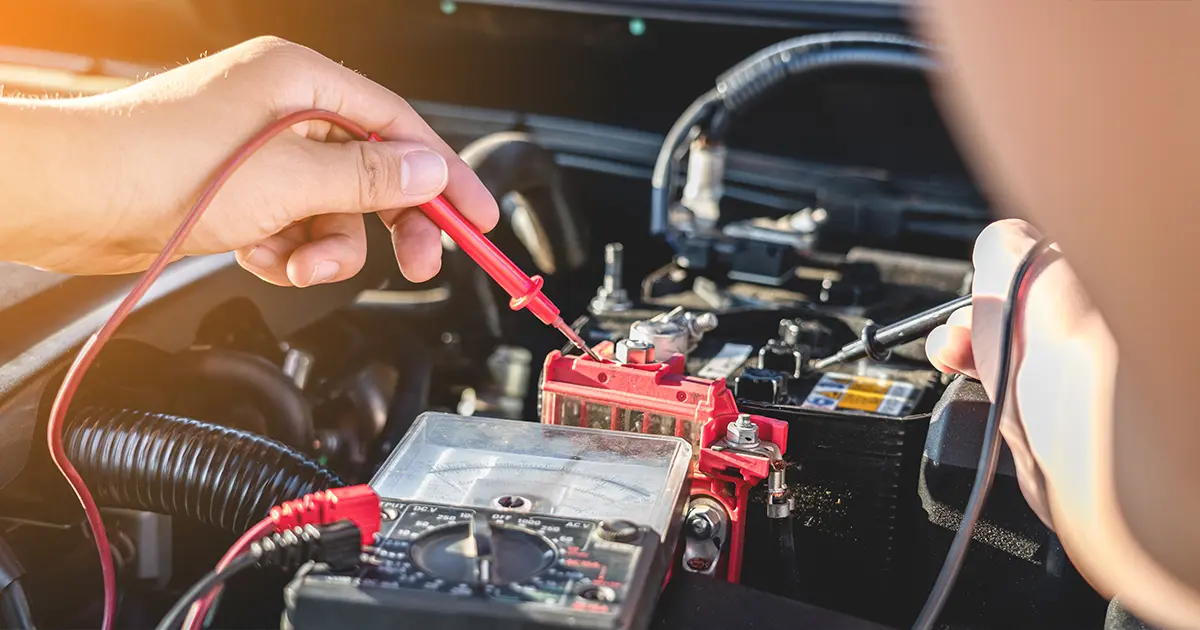Your car’s electrical system is the backbone of many essential functions, from starting the engine to powering the lights and radio. Without proper maintenance, you might face problems like a dead battery, dim lights, or even complete electrical failure. Regular checks can help you avoid these issues and keep your car running smoothly. Important steps include inspecting the battery, alternator, wiring, and fuses. In this blog, we’ll explain why regular car maintenance for your electrical system is crucial and how to keep it in top condition.
Most Important Electrical System Car Maintenance
Here’s a list of car maintenance for the electrical system:
1. Battery Maintenance
The battery is the heart of your car’s electrical system. It provides the initial energy to start the engine and powers the lights, dashboard, and more when the engine is off. Check your battery terminals regularly for corrosion and make sure connections are tight. Clean the terminals using a mix of baking soda and water if needed. Also, check the battery’s charge level and replace it every 3 to 5 years to prevent sudden failure.
2. Alternator Care
The alternator keeps your battery charged while the engine runs. If it stops working, your car will rely only on the battery until it dies. Signs of a bad alternator include dim headlights, flickering dashboard lights, and a battery warning light. During routine maintenance, have a mechanic check the alternator belt tension and electrical output. Replacing worn belts early can prevent future breakdowns.
3. Checking the Starter Motor
The starter motor cranks the engine when you turn the key or push the start button. Over time, it may wear out due to frequent use. Common signs of a weak starter include clicking sounds or a slow engine crank. Keeping the electrical connections clean and tight helps the starter perform efficiently. If you experience repeated starting issues, get it inspected by a professional mechanic.
4. Inspecting Wiring and Fuses
Wiring and fuses carry electricity to different parts of your car safely. Damaged wires, loose connections, or blown fuses can cause lights, wipers, or sensors to stop working. Check for frayed wires, burnt smells, or exposed cables under the hood. Always replace blown fuses with the same type and rating. Proper wiring care prevents short circuits and protects your car’s electrical components.
5. Keep an Eye on Dashboard Warning Lights
Modern cars use dashboard warning lights to signal electrical issues. If you see the battery, check engine, or ABS light turn on, don’t ignore it. These indicators can point to voltage drops, alternator failure, or system faults. Use an OBD scanner or visit a mechanic to diagnose the issue quickly. Early attention prevents small problems from turning into expensive repairs.
6. Clean and Secure Electrical Connections
Dirt, corrosion, or moisture around electrical connections can interrupt power flow. Regular cleaning helps prevent this. Make sure all connectors are tightly fitted and sealed from water. Using a dielectric grease on terminals can help prevent rust and ensure strong conductivity. Keeping your electrical connections clean extends the life of your car’s electronic systems.
7. Avoid Overloading the Electrical System
Adding too many aftermarket accessories like extra lights, speakers, or chargers can overload your electrical system. This puts stress on the alternator and battery, reducing their lifespan. Always install additional accessories with the correct fuses and relays. Consult a qualified technician before adding new electrical devices to your car to ensure safe installation.
8. Regular Professional Inspections
Even if everything seems fine, it’s smart to have your car’s electrical system checked by a professional every few months. A trained technician can test the battery, alternator output, starter performance, and wiring integrity. Car electrical repair helps catch small issues before they become serious failures. Preventive care is always more affordable than emergency repairs.
Benefits of Regular Electrical System Maintenance
Keeping your electrical system well-maintained brings several advantages:
- Reliable starting power every time you turn the key.
- Brighter headlights and consistent lighting performance.
- Longer battery and alternator life.
- Reduced chances of sudden breakdowns.
- Improved safety and comfort while driving.
With consistent maintenance, you can drive confidently knowing your car’s electrical system is functioning properly. Your driving habits affect car maintenance, too.
Conclusion
Your car’s electrical system plays a key role in keeping your vehicle reliable and safe. Regular maintenance, including battery checks, alternator testing, wiring inspection, and fuse replacement, ensures everything runs smoothly. Ignoring electrical issues can lead to costly repairs and unexpected breakdowns. Keeping up with your car’s maintenance schedule helps extend its life and performance. Take the time to care for your vehicle’s power source and prevent problems before they start.
Keep your car’s electrical system in peak condition with expert maintenance from Royal Prince Auto Care. Visit today for professional inspection, battery testing, and full electrical repair services you can rely on!

